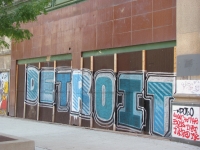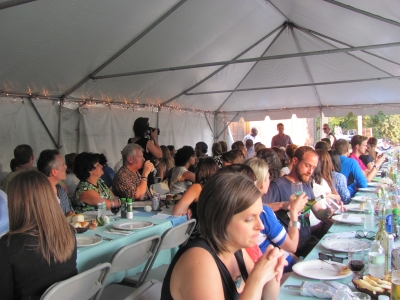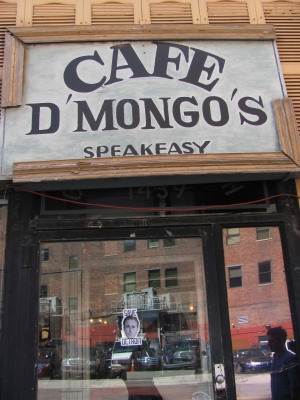It’s early evening of an August scorcher and I’m seated under a much-appreciated tent at Detroit’s Earthworks Urban Farm. Located in the city’s east side, the 2.5-acre organic farm grows food to benefit its own soup kitchen and runs a variety of initiatives to promote healthy eating and gardening, believing all residents deserve fair access to nutritional food choices.
We’re here for Dinner in the Field, an event organized by four Detroit nonprofits who share a passion for their struggling city and a determination to see it move forward. If you’re searching for a sign that Detroit will rise up again, that a recent bankruptcy will not seal its fate, a seat at this dinner table may be your first clue.
My fellow 100-plus guests are civic-minded, forward-thinkers, some of whom lived in Detroit all their lives, others who left but have since returned and still others who recently uprooted from Chicago, New York and other cities deemed more favorable and stable for staking one’s livelihood and life. Yet, here they are. Impassioned, emboldened, savvy, entrepreneurial—and dedicated to unleashing the assets and goodness of a city they believe in.
Dinner in the Field, Earthworks Urban FarmSpearheaded by visionary and social entrepreneur Chad Rochkind, the event is one of many he helps organize each year as executive director of Detroit Harmonie, a three-year-old organization dedicated to creating the infrastructure for greater civic and social innovation. “Innovation happens when people from different perspectives come together to find solutions and our role is to connect those people,” he explains.
Bridging the Divide
Events are purposely set in diverse neighborhoods to counter Detroiters’ tendency toward siloes and to bridge the cultural divide. “These events make sure spontaneous cultural collisions are possible,” Rochkind says. “We don’t want to leave anyone behind.”
It’s a mission that Devita Davison can certainly get behind. The food entrepreneur grew up in Detroit, settled in New York, and then had her home wiped out by Hurricane Sandy. Instead of rebuilding, she decided to return to her hometown and join the growing local food movement. She’s now running Detroit Kitchen Connect, offering low-cost commercial kitchen space and equipment to entrepreneurs working at improving the accessibility of healthy food.
Davison compares the narrative of her hometown to that of New Orleans—what she refers to as Detroit’s sister city. “In New Orleans, they did a very good job of hiding the poor in the Ninth Ward—until the hurricane,” she explains. “It’s the same in Detroit,” she adds, asking emotionally: “How can you have these neighborhoods falling apart in the richest country in the world?” Any revitalization effort, if done right, must be inclusive.
To see more of Elisa’s trip to Detroit, check out the Detroit photo galleryThis model of social change has particular resonance in the beleaguered Motor City, as it embodies grassroots, local solutions over the traditional top-down approach. It’s part of a global trend, offers Rochkind, whose master’s thesis focused on the issue. “We see it everywhere; the classic top-down command didn’t work because it’s not sensitive to context.”
Born and raised in Detroit, Rochkind, like many others, moved away after college. But one call asking him to lead Detroit Harmonie was all it took to bring him back. “It was an opportunity I really couldn’t pass up,” he says. “There is no other place I’d rather live at this point. Other cities are already built; we’re building Detroit now.”
Challenges Meet Hope
There’s no denying the city is facing immense challenges. Abandoned buildings and homes dot Detroit’s immense landscape, poverty and unemployment is pervasive, streetlights are commonly dark, debt is high and safety a common concern.
But there’s something else in the air and it’s palpable. It’s called hope. Not your airy-fairy kind, one found in empty rhetoric, broken dreams and listless conclusions. This hope is backed by entrepreneurial savvy, pragmatic solutions and ballsy conviction.
In Midtown, for example, a surge of entrepreneurial ventures play an integral role in the city’s revitalization. Take Avalon International Breads, one of the first small businesses to move into the city, Great Lakes Coffee Roasting Company, impeccably designed with sustainable materials, a popular spot for young entrepreneurs. And Shinola, producing watches, bikes and leather goods with a mission of reviving the tradition of manufacturing in the city.
Not surprisingly the demand for business funding has never been higher at Opportunity Resource Fund, a nonprofit that funds small businesses and initiatives that support communities. “There’s a number of young, entrepreneurial-minded coming into Detroit,” says president and CEO, Christine Coady Narayanan. “They see the city as one they could make their own. “They don’t see failure, they see opportunity.”
To see more of Elisa’s trip to Detroit, check out the Detroit photo galleryThat the auto industry is no longer the defining monoculture helps. As do the investors staking their claim, most notably billionaire Dan Gilbert, founder of Quickens Loans. It’s not hard to see why some refer to the score of buildings he’s bought with a $1billion investment through his Rock Ventures LLC as Gilbert-Ville.
Gilbert has certainly suffused this town with something special, a reminder that it’s worthy. “I like people with nerve,” Larry Mongo tells me outside hisCafe D’Mongo’s Speakeasy, a beloved mainstay in downtown Detroit.” He’s doing what Henry Ford did to Detroit; he’s investing in his dreams and an unselfish vision.” Perhaps so. But Gilbert is not the only dreamer in the city.
The power of innovation, savvy and entrepreneurship
Detroit is experiencing a rise of young social innovators who, no longer content with sitting still, are taking the future of the city into their own hands—and doing so with smarts and strategic vision. Take Amy Kaherl, a local celebrity of sorts thanks to her work with Detroit Soup, a monthly dinner that uses microloans to fund creative community projects. Participants pay five bucks, listen to four presentations—ranging from art, urban agriculture, social justice, technology, etc.— and then take a vote on which project they like best, with the winner taking home the evening’s earnings.
The results have been impressive. Over $40,000 has funded ideas, turning some into nonprofits, others small businesses. Parks have been cleaned, jobs created and resources shared. There’s even been a marriage, one of many indirect consequences of people coming together to support shared struggles and dreams.
It’s all about connecting people and recreating these spaces, says Kaherl. As for the elephant in the room—bankruptcy—she’s not phased. “That wasn’t a surprise to anyone; we’ve lived without a lot of amenities for a long time.” On the contrary, the filing has given the city a fresh start, a way to begin over again. “We just feel we need to keep moving on.”
Rochkind agrees. Detroit has been experiencing a Katrina without the water for many years now, he says. “New Orleans capitalized on that moment [the hurricane] while our trajectory was a slow progression, but bankruptcy can be the catalyst.” The good news, adds Kaherl is that innovation comes out of necessity. “And lord knows we have a lot of it.”
Elizabeth Garlow knows it too. She runs Michigan Corps, supporting economic recovery in communities across the state by empowering citizens to collaborate on social innovation. “The greatest tension leads to the greatest creativity,” Garlow tells me when I visit her office in Midtown Detroit’s newly established co-working space, the Green Garage.
Housing businesses focused on social and environmental responsibility, the building—a one-time showroom for Model Ts—has been completely renovated with sustainability its middle name, including the use of reclaimed furniture, a railing that once stood as a steam pipe, and top-notch recycling efforts.
Scaling for Impact
Over the past year, says Garlow, there’s been a groundswell of local people offering up great ideas to help their communities. “We just need to give them a platform.” Among its initiatives, Michigan Corps hosted the country’s first statewide competition in social entrepreneurship, offering winners coaching and financial support. They also launched Kiva Detroit, providing micro-loans to small businesses in the city, making it the first city in the U.S. to partner with the well-known global organization.
“We believe small things will be Detroit’s next big thing,” Garlow says. But, she cautions, organizations need to do more than scale, they must scale for impact. “You can’t do anything unless you think systematically,” she explains. “You must work with people addressing all parts of the ecosystem.”
It’s one of many challenges these social innovators are up for, with lessons learned weighing heavily in their back pockets, whether from other cities who’ve experienced revivals or from their own history. “There’s been a lot of false renaissances in the city,” offers Rochind, “but I always knew that there would be a moment when Detroit would be led organically, by young people.”
That moment may be upon us and it’s one that many seem eager to see through. “When the narrative is written about how a great city came back, I want to be part of the story,” Davison offers emphatically, tears in her eyes. “This is about community, something much bigger than ourselves.”
To see more of Elisa’s trip to Detroit, check out the Detroit photo gallery
——————————–
While researching the story, Elisa stayed at the Detroit Marriott at the Renaissance Centre. Located in the heart of downtown Detroit, adjacent to the beautiful Riverwalk, the hotel – the tallest in North America – is housed in the General Motor World Headquarters, a unique testament to the city’s storied history. As it begins a $30 million renovation project, the Detroit Marriott will be playing an integral role in the city’s revitalization efforts too.
Elisa Birnbaum is the co-founder of SEE Change Magazine, and works as a freelance journalist, producer and communications consultant. She is also the president of Elle Communications.




